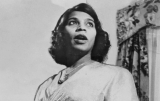The Philadelphia Orchestra’s home in the Kimmel Center for the Performing Arts, currently called Verizon Hall, is being renamed Marian Anderson Hall in honor of the Black American contralto and Civil Rights Icon. The ceremony will take place on June 8, 2024 with the Great Stages Gala, featuring The Philadelphia Orchestra and Music and Artistic Director Yannick Nézet-Séguin, actress and singer Audra McDonald, soprano Angel Blue, and jazz pianist Marcus Roberts. A statue of Anderson is planned for the vicinity of the hall.
Richard Worley and wife Leslie Miller, who live in suburban Bryn Mawr, are underwriting the name change with a $25 million gift to the Philadelphia Orchestra and Kimmel Center. Worley joined the orchestra’s board in 1997 and served as its president from 2009-20; Miller was on the Kimmel Center board from 1999-2008, serving as acting president.
Anderson, who died in 1993 at age 96, was born in Philadelphia and in 1955 became the first Black singer to appear at New York’s Metropolitan Opera. Earlier she encountered numerous setbacks.
Eager to further her vocal training, she applied to the Philadelphia Musical Academy at 1617 Spruce Street, a conservatory of approximately 2,000 students. Denied admission because of her race, she sought private instruction, supported, in part, financially by Union Baptist congregants and her community. Her persistence first paid dividends in 1918, when, at 21, she made her debut at the Academy of Music on Broad Street with the New York Syncopated Clef Club, presented by G. Grant Williams, a concert promoter and editor of The Philadelphia Tribune.
In the ensuing years, Ms. Anderson made her Carnegie Hall debut and began to see a degree of career success. Determined to forge a career as a classical singer, she traveled to Europe, which at the time was friendlier to Black artists. Her efforts met with popular acceptance and approval, particularly in Scandinavian countries, where she caused “Marian Fever.” Returning to the United States a global phenomenon, she continued to encounter racism, including when she was to perform a recital in Princeton, New Jersey, and was denied lodging at hotels because of her race. The scientist Albert Einstein intervened, offering her a room at his home, and creating a life-long friendship in the process.
The impact of discrimination on Ms. Anderson’s career came into public focus in 1939, when the Daughters of the American Revolution withdrew their permission for her to sing at Constitution Hall in Washington, D.C. Supported by her manager Sol Hurok, First Lady Eleanor Roosevelt, and sponsored by Philadelphia Orchestra Music Director Leopold Stokowski and others, she turned the Lincoln Memorial into a historically significant stage. There, she sang a mix of classical repertoire and spirituals, including “My Soul’s Been Anchored in the Lord,” arranged by Florence Price, before an audience of more than 75,000 and a radio audience in the millions. That legendary performance, given on April 9, 1939, was a formative moment in the nascent Civil Rights movement, a powerful rebuke to bigotry and injustice. A 10-year-old Martin Luther King, Jr., reportedly heard it; 24 years later, he invited Ms. Anderson back to the Mall to sing at his March on Washington, as an icon of the ongoing fight for equity and access.
Marian Anderson went on to become the first Black singer to perform a leading role at the Metropolitan Opera. Over the course of her extraordinary career, she sang 12 times with The Philadelphia Orchestra, and, after her retirement from singing, narrated Aaron Copland’s A Lincoln Portrait with the Orchestra four times, including with Copland himself conducting. Ms. Anderson served as a delegate to the United Nations Human Rights Committee and as a Goodwill Ambassador for the United States Department of State, giving concerts around the world. She received the first Presidential Medal of Freedom in 1963, the Congressional Gold Medal in 1977, the Kennedy Center Honors in 1978, the National Medal of Arts in 1986, and a GRAMMY Lifetime Achievement Award in 1991.






















